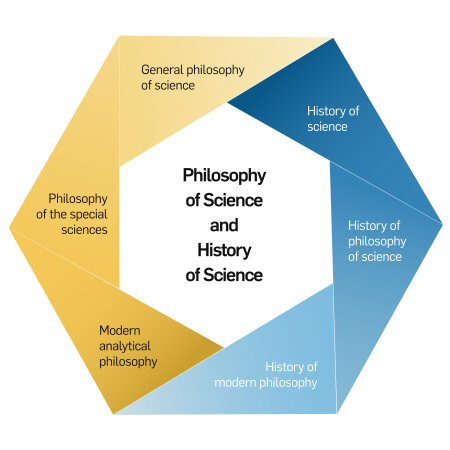
Philosophy of science systematically analyses the premises of knowledge, methods, purposes and results of individual scientific disciplines as well as science in general. History of science studies the genesis and development of scientific knowledge and its related techniques in their respective institutional contexts as well as in its broader social context.
The Chair of Philosophy and History of Science pursues an integrative concept regarding both areas: Philosophy of Science provides History of Science with systematic key questions; on the other hand, History of Science serves as a laboratory without which a comprehensive Philosophy of Science could hardly exist: „Philosophy of science without history of science is empty; history of science without philosophy of science is blind.” (Imre Lakatos)
Within this framework, research projects on the current philosophy of science are just as important as historical studies, especially in conjunction with the history of modern philosophy.
... im Rahmen der Ringvorlesung der RUB am 10.07.2024 "Kants Philosophie – Aktualität, Tradition und Kritik"
Kants Theorie der 'eigentlichen' Wissenschaft(en) und die moderne Wissenschaftstheorie.
Das Video kann hier herungeladen oder angesehen werden:
... im Rahmen des Wissenschaftshistorischen Seminars vom 5. Oktober 2021
organisiert von der Nationalen Akademie der Wissenschaften Leopoldina.
Thema: Hermann von Helmholtz als Naturwissenschaftler, Wissenschaftsorganisator und Philosoph
https://www.youtube.com/watch?v=l7GHyEcmeA8
Hinweis: Beim Klick auf den Play-Button wird eine Verbindung mit einer RUB-externen Website hergestellt, die eventuell weniger strengen Datenschutzrichtlinien unterliegt und gegebenenfalls personenbezogene Daten erhebt. Weitere Informationen finden Sie in unserer Datenschutzerklärung.
Sprechstunde von Prof. Dr. Helmut Pulte:
Mi 12 - 13 Uhr (in der Vorlesungszeit).
Sprechstundentermine in der vorlesungsfreien Zeit
finden nach Vereinbarung statt.
Office hours:
Wed 12 am - 1 pm (during lecture period)
Office hours during the Lecture-free period
20.08.2025 (12 am - 1pm)
24.09.2025 (12 am - 1pm)
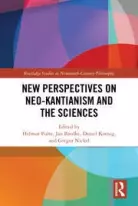
Beschreibung: This volume considers the exchange between the Neo‑Kantian tradition in German philosophy and the sciences from the last third of the nineteenth century to the Great War and partly beyond. The various contributions look at the ways in which a certain Kantian orthodoxy’ was influenced by new developments and whether (and how) it had some impact on the development of the sciences. The volume is not limited to the ‘exact sciences’ of mathematics and physics, but also takes into account less recognised disciplines such as biology, chemistry, technology and psychology. It is complemented by contributions that contrast Neo‑Kantianism with other ‘scientific philosophies’. For more information click here.
.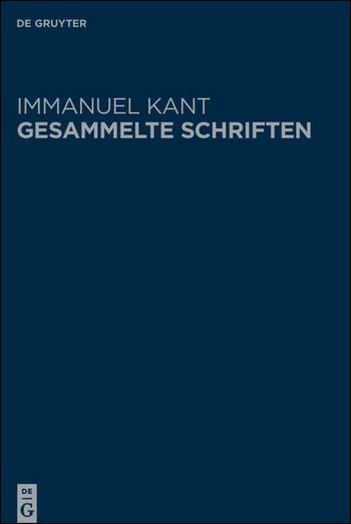
Beschreibung: Der erste Band enthält u. a. die Schriften aus den Jahren 1747 bis 1756, darunter Gedanken von der wahren Schätzung der lebendigen Kräfte (hg. von Helmut Pulte), Allgemeine Naturgeschichte und Theorie des Himmels (hg. von Thomas Sturm und Fabian Burt) sowie eine Reihe kleiner Schriften, (hg. von Hansmichael Hohenegger, Antonio Lamarra, Konstantin Pollok, Riccardo Pozzo und Thomas Sturm).
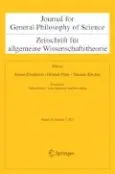
Journal for General Philosophy of Science
Volume 56, Number 2 / June 2025
„Describing and Understanding the World. From Newton’s Principia to Laplace’s Traité de mécanique”,
in: A Cultural History of Mathematics in the Eighteenth Century.
Ed. by M. Bullynck. London: Bloomsbury 2023, 163-192.
Helmut Pulte
“Klassisch – Modern – Digital? Eine kleine Geschichte des Wissensbegriffs, mit einer Note zur digitalen Bildung“, in: Bildung und Digitalität.
Analysen – Diskurse – Perspektiven.
Hg. von S. Aßmann und N. Ricken. Wiesbaden: Springer 2023, 275-311.
Helmut Pulte
„Die frühe Fries-Schule", in: Grundriss der Geschichte der Philosophie
(19. Jahrhundert, Deutschland, Bd. 1). Hg. von G. Hartung, Basel 2020,
(mit M. Anacker), 283-293.
Helmut Pulte
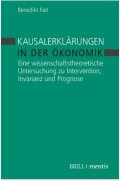
Kausalerklärungen in der Ökonomie. Eine wissenschaftstheoretische Untersuchung zu Intervention, Invarianz und Prognose", BRILL / mentis 2020.
Benedikt Fait
"The Reception of Isaac Newton in Europe", ed. by S. Mandelbrote and H. Pulte. 3 vols., London: Bloomsbury 2019.